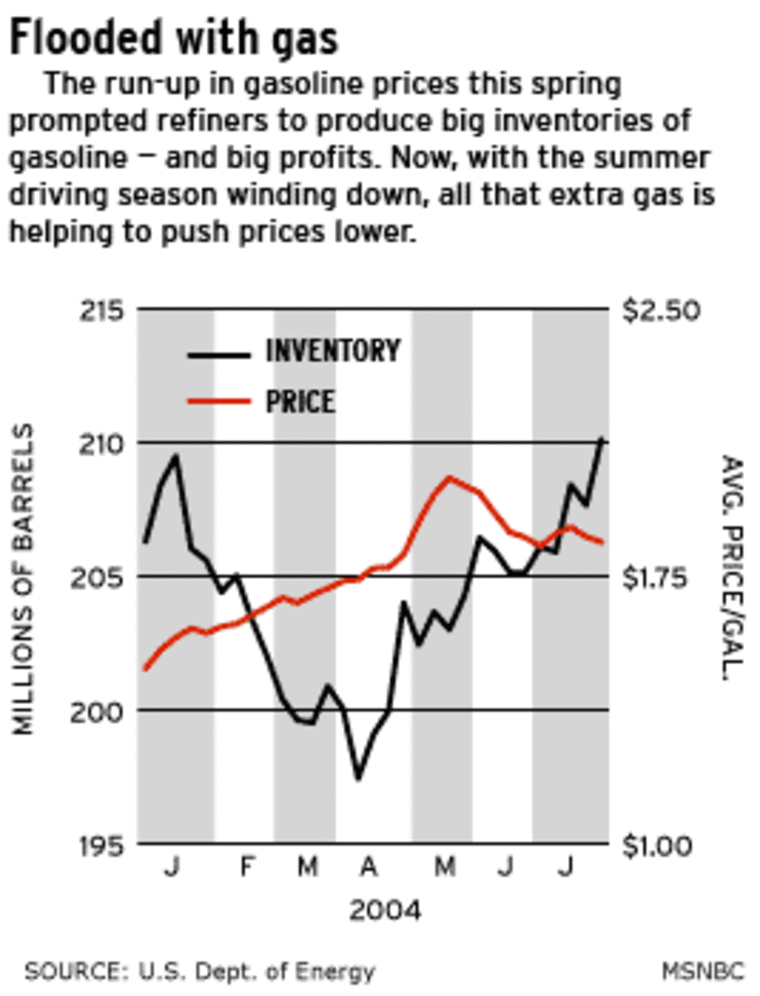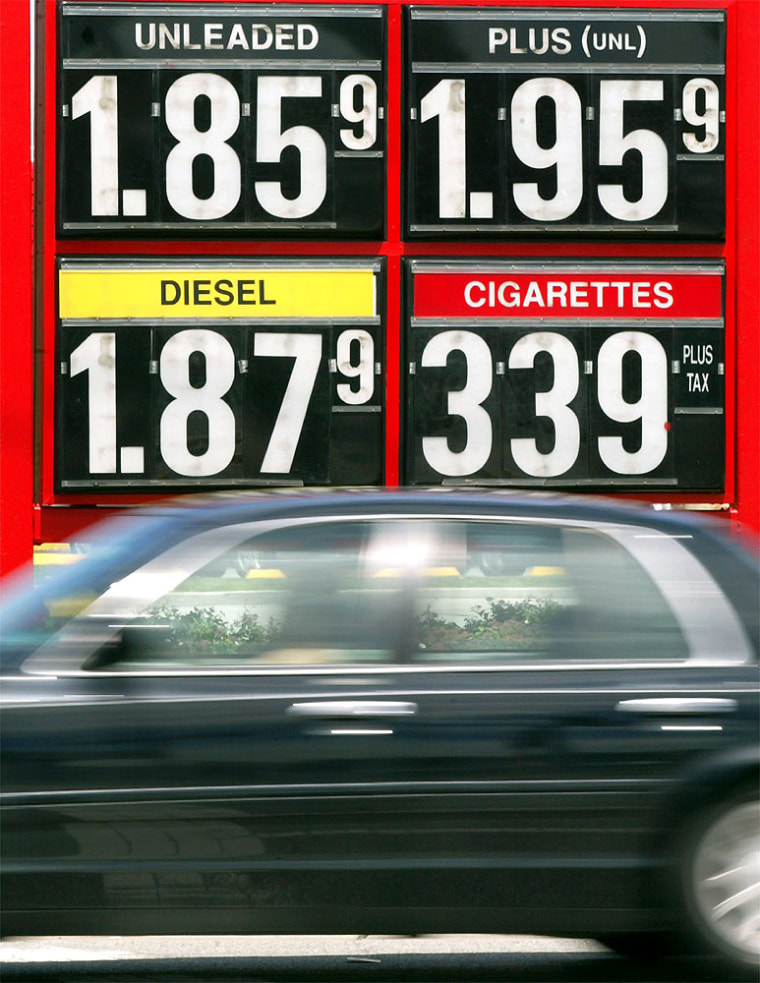Drivers at the pump fumed this spring as gasoline prices soared much faster than crude oil prices. Now, with oil prices hovering at near record levels -- approaching $50 a barrel -- gasoline prices are easing. What gives?
First off, U.S. gasoline refiners have been operating at near-record levels -- nearly 94 percent of capacity -- in recent months, so gasoline stockpiles have easily accomodated the demand.
“We had such great prices and great (profit) margins for refiners that they ran as hard as they could in the second quarter and produced a tremendous amount of product -– one of the strongest quarters ever,” said Jacques Rousseau, an oil analyst with Friedman, Billings Ramsey & Co. in Houston.

Higher gasoline prices earlier in the year also damped down demand for gas. Now, with the summer driving season winding down, gasoline dealers have lots of gas to sell, which is helping to forces prices lower. The nationwide average price of a gallon of regular unleaded has fallen from more than $2 per gallon in May to an average of $1.80 to $1.90 per gallon during the past 6 or 7 weeks.
The big build-up of gasoline inventories isn't likely to continue. For one thing, the huge profits margins that spurred the surge in production -- and reaped big profits for refiners -- are begining to narrow. For another, refiners can't operate flat-out for long without having to shut down for maintenance. And by late summer, refiners typically begin diverting more capacity to build up inventories of heating oil to get ready for winter. (Those inventories are at about average levels for this time of year.)
Those factors, coupled with the recent, sudden run-up in crude oil prices, could halt the trend of declining gasoline prices.
“It is happening right now, and it’s imminent in a lot of markets,” said Trilby Lundberg, who publishes a weekly survey of gasoline prices. “Many of the wholesale buyers -- hundreds of them that we know of -- have already received announcements of price hikes. How big they are we don’t know.”
Oil prices have been steadily rising toward $50 a barrel -– despite reports than inventories are in good shape. The problem is that global demand of about 82 million barrels a day is just slightly below the total production capacity of the world’s oil producers. OPEC has vowed to produce more to bring prices down, but only Saudi Arabia can pump faster and even the Saudis have little extra capacity left. Despite reports in April that the Saudis assured the Bush White House of lower oil prices in time for the November election, they have so far been unable to deliver.
Meanwhile, several million barrels a day of crude production from three major producers are vulnerable to being cut off. Oil traders have been closely watching the endgame of the ongoing legal battle in Russia between the Kremlin and oil giant Yukos, which has threatened to shut down exports. In southern Iraq, recent attacks on oil facilities have crimped oil shipments.
And, though the recent referendum calling for the ouster of Venezuelan president Hugo Chavez apparently failed, the prospect of civil unrest still hangs over that country's 3-million barrel per day production capacity, which was shut down for weeks early last year by a massive strike. The Chavez election victory also makes it less likely that Venezuela will boost output in the short term, according to Lundberg.
“What we have is no change in the anti-foreign view,” she said. “And the anti-foreign ideology means there will be probably no white knight in the form of foreign investment to increase Venezuela’s oil production capacity.”
More drilling?
With oil prices as high as they are, oil producers have an incentive to drill more wells to produce more oil. But it would take years for new production to come onstream. And despite the recent run-up, oil prices remain volatile. So most oil producers want to see prices stabilize before placing any new bets on expanded production.
“It is very possible we might see $50 oil,” said oil and gas analyst Fadel Gheit at Oppenheimer and Co. “But the higher oil prices go, and the longer they stay above $40, the steeper the decline is likely to be.”
Higher oil prices are already beginning to weigh on the economy, which is cutting into demand, said Gheit.
Given the important of the economy in this fall’s election, lower oil prices could give the Bush campaign a substantial boost. But analysts say there's little sign the president has gotten any help on that score from the Saudis or his supporters in the oil industry.
“The only person who has the magic bullet is president Bush,” said Gheit. “If he wants oil prices to come down tomorrow by $10 he can say that we are going to release oil from the Strategic Petroleum Reserve. It worked for his father and predecessor, and it would work again for him. But as we know of late he said he would not do that.”
